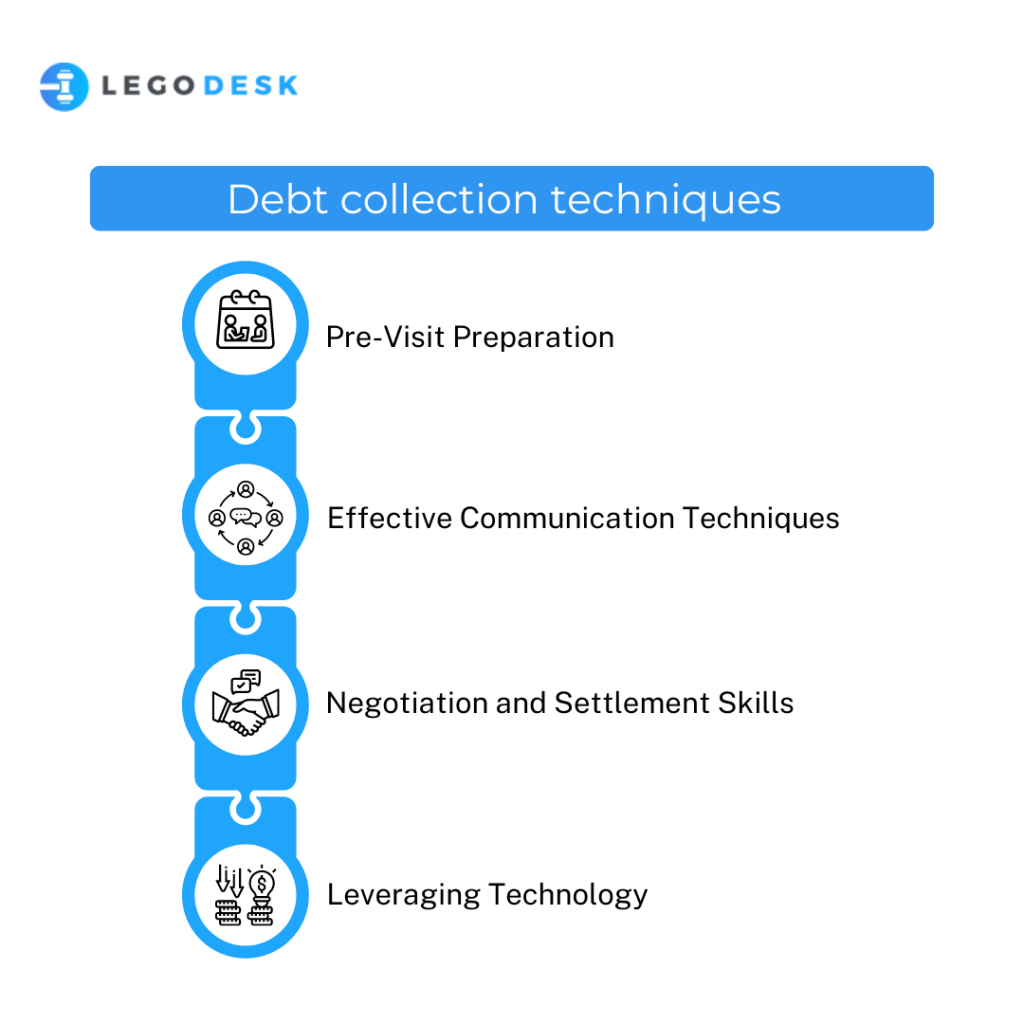Effective Field Debt Collection Techniques: Navigating Challenges and Maximizing Returns
Debt collection through field operations is the most critical component of any debt collection strategy. While online communication, automated communication, and phone calls have an important place in the debt collection arsenal of a lender, there is no clear substitute for a visit by a debt collection agent to a borrower.
However, field debt collection poses significant challenges and has major obstacles for the agent. It is a role that is rife with pitfalls and skillful techniques need to be applied and leveraged to navigate through and deliver a good return on investment for the lender.
In this guide, we’ll cover some of the major debt collection techniques so that field operations can be made as effective as possible.

Pre-Visit Preparation
Before making a visit to the borrower, the agent must ensure that they are completely prepared for the visit. Being fully prepared involves a number of things depending on the exact conditions of the case.
The agent must be completely familiar with the profile of the borrower such as their age, occupation, financial situation, purpose of loan, and so on. They must know the payment history of the borrower and be familiar with any previous communications that have taken place with the borrower.
Further, the agent must be familiar with all the documentation that is part of the transaction between the lender and the borrower. They must know about the security which has been given, if any, as part of the transaction. They must also know about any guarantors that are part of the picture.
All of this preparation is not futile and is the best field debt collection technique. The preparation and homework will help the agent put their best foot forward when approaching the borrower and make it easier for them to persuade the borrower to settle their dues as soon as possible.
Effective Communication Techniques
This factor is a catch-all technique that will help agents with all their dealings with defaulting borrowers. In fact, lenders must do their most to train their agents in effective communication techniques so that agents can properly represent the lender in the field when speaking to customers.
It can be easy to overlook communication and approach when sending field operatives to borrowers. After all, it’s just a matter of placing pressure on the borrower to make a quick payment. However, in most circumstances, communication can play a key role in how the borrower perceives their relationship with the lender.
In case the borrower feels that the relationship has turned sour and the lender is acting against the interests of the borrower, it may make it even harder for agents to perform their job and collect the overdue payments.
In case the matter is deemed to be suitable for negotiation and restructuring by the lender, the previous communications with the borrower will play a role in the likelihood of a successful negotiation.
Negotiation and Settlement Skills
It is often necessary for debt collection agents to negotiate with borrowers. Agents will need to persuade the borrower to make payments which the borrower may be unwilling to do. In such circumstances, the lender may feel that being more flexible with the borrower can overall benefit the lender.
Some of the ways in which the agent can negotiate with the borrower can be by providing discounts and waivers. The agent can persuade the borrower to make an early payment by reducing the fees or overdue interest that may be being charged by the lender.
Otherwise, they can offer flexible payment options. These payment options can be tailored to suit the financial situation of the borrower.
For example, in case the borrower runs a business and they are expected a large amount of revenue in three months, the lender can offer to wait for three months before collecting a large payment on their overdue amount.
Further, lenders need to be abreast of the importance of properly documenting any settlements that are made or any new terms or conditions that are entered into. This documentation can save both the lender and the borrower from disputes in the future.
Leveraging Technology
As mentioned earlier, debt collection is a difficult role for any agent. Hence, the lender should do everything in their power to make the role easier for the agent. That’s why providing the latest tools to the agent can go a long way in ensuring that agents are as effective in their jobs as possible.
The first type of tool that can help an agent is a field operations mobile that contains all the information that they need about the borrower in a single place. If the lender can provide such an app, it can make the job of the agent a lot easier and also save them considerable time. It will also help to ensure that all agents are always prepared when they approach a borrower and they are not caught off-guard during their discussions.
Secondly, agents need to physically travel a lot from one place to another. Hence, it can be hard for agents to keep track of the numerous addresses of the various borrowers. They should be equipped with a GPS and geo-tracking device that can help them navigate the city as efficiently as possible.
How Can Legodesk Help?
Legodesk offers a software tool that has been designed especially for lenders and debt collection agencies. Our software provides a range of features that can help the debt collection process become more efficient such as legal notice automation, case management, and contact management.
It can help debt collection agents perform their job by providing a single source of truth for information about the borrowers. Legodesk can be one of the most effective field debt collection techniques that a lender can leverage.
Lenders such as banks, NBFCs, and enterprises all trust Legodesk to be an indispensable part of their debt-collection technology stack.
Wrapping Up
Debt collection through field operations can be a difficult challenge for most lenders. However, the potential return on investment from the effort makes in unavoidable. Without field operations, lenders have little at their disposal once a borrower commits default.
Effective field operations can prevent a matter from going to court which can be even more costly and less effective. Hence, its crucial for lenders to provide their agents with all the tools that can help make them more effective at their jobs and also do their best to utilize the latest field debt collection strategies.
